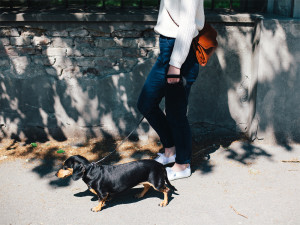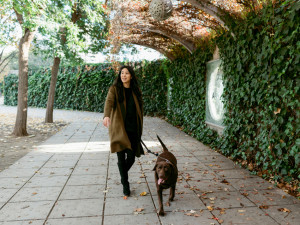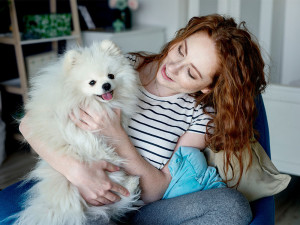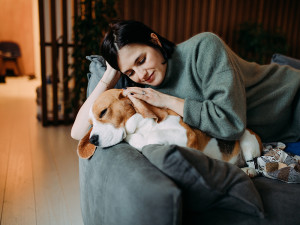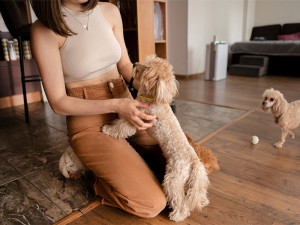My Dog Sleeps All Day – Is that Normal?
Dogs need more sleep than humans. Here’s how much is healthy
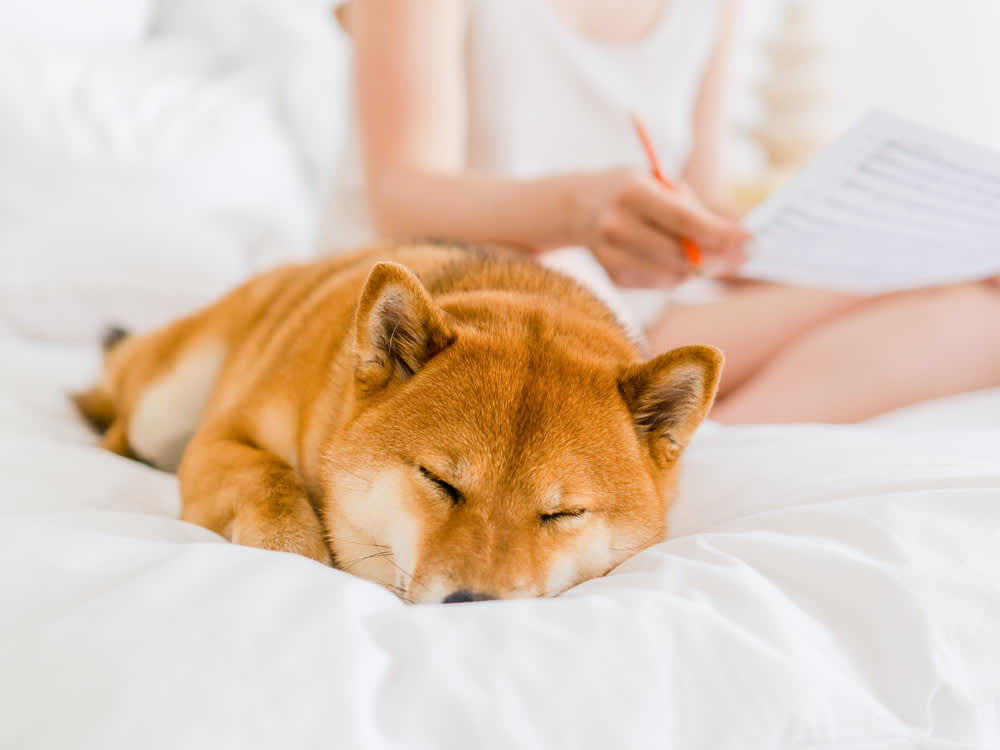
share article
As a dog trainer and behaviourist, I’m often asked: “Is what my dog doing normal?” Among the top topics are licking pee, eating pooopens in a new tab, chasing bikes, humpingopens in a new tab, and, well, the list goes on. In most cases, these are all perfectly normal behaviours – they’re just not something that we‘re familiar or even comfortable with.
However, when it comes to sleeping, there are some general guidelines that can help you determine whether your dog is normal or not. Keep reading to learn if it’s normal for dogs to sleep all day – plus, how to know if your dog has sleep issues.
How much sleep do dogs need?
If you’re a first-time dog parent, you might be surprised by just how much sleep your dog needs. The average dog will sleep between 12–14 hours a day. This is generally made up of day-time naps and overnight sleep.
Puppies need even longer, typically sleeping 18–20 hours a day until around 12 weeks of age. As dogs start to reach their mature years, they will sleep more as their bodies and minds tire quicker. Size, activity, age and health are all factors in how much sleep a dog needs but most owners should expect their adult dog to sleep at least half of the day.
Sleep needs do change as dogs age
In a studyopens in a new tab on dogs’ sleep patterns, a team of researchers looked into the effects of age and feeding frequency on dogs’ sleep patterns. Dogs were in one of three age ranges (1.5–4.5 years, 7–9 years, 11–14 years) and were fed once or twice daily.
Researchers found that older and middle-aged dogs slept more during the day than young adult dogs, but that was because they took more naps and not because their naps were longer. Older and middle-aged dogs also slept more at night than younger dogs because they had a longer total sleep interval at night (waking up later) and woke up fewer times during the night.
Dogs of all ages were affected similarly by being fed twice daily instead of once a day. Dogs fed more frequently took fewer naps during the day, but the naps lasted longer. Dogs fed twice a day fell asleep earlier at night but woke up earlier, too, with a decrease in total time sleeping at night. (The earlier waking time more than compensated for the earlier bedtime.)
Why does my dog sleep so much?
Much like us, dogs need sleep to remain healthy. The human sleep cycle in a 24-hour period is fairly simple. We are awake during the daytime and have one long sleep at night. While we sleep, we enter restorative phases called deep sleep and REM. It is during this time that the body works to restore tissue and strengthen our immune system.
During REM, brain activity increases and this is good for learning and development, and retaining information and memories. The National Institute of Neurological Disorders and Stroke states that during REM, the brain exercises important neural connections, which are key to mental and overall well-being.
Dogs have a more scattered sleep pattern within a 24-hour period, consisting of short naps throughout the day and a long sleep during the night. These periods of sleep are punctuated with waking up to check their environment and scan for changes/dangers. Dogs enter into REM quicker than humans (which is why you often see them acting out dreams). However, one theory suggests that this constant state of readiness leads to less REM sleep, causing dogs to need to sleep more in order to feel restored.
When dogs don’t get enough sleep, they can become sleep deprived; common symptoms from lack of sleep may start to appear, though they’re not as easy to notice as they are in people.
Signs your dog isn’t getting enough sleep
If your dog isn’t napping during the day and is consistently restless at night, that’s not normal. This lack of sleep may cause them to be needy, whiney, restless, sluggish or even disinterested in life. Displaying these symptoms on occasion is OK, and you can allow for a cranky day once in a while. The best remedy is to tire them out with a long walk or game of fetch to bring about sleep and get them back into their standard sleep cycle.
Dogs who have severe sleep disorders will exhibit more concerning behaviours such as excessive whining or crying, becoming disoriented when performing basic tasks, or becoming aggressive because they are increasingly on edge from the lack of rest. You may notice your dog becoming more irritable and agitated. On the flip-side, they could begin to withdraw socially and stop engaging as they previously would have.
Signs that your dog isn’t getting enough sleep can come on suddenly or gradually. Any symptoms that are concerning should be discussed with your veterinarian to rule out the possibility of medical-related issues.
Reasons your dog can’t sleep
Your dog may be suffering from insomnia for a number of reasons:
Pain, illness or injury
Painful arthritis could be causing insomnia as your dog cannot be still and feel comfortable. Prescribed pain relief or special massage treatments could help. Sleep apnea, which is commonly seen in flat-faced dogs and obese dogs will cause a dog to jolt awake when their airways block. Multiple sleep interruptions can be frustrating and leave a dog feeling constantly tired. After a vet has ruled out any medical issues, the next step is to look at what else could be the cause of your dog’s restlessness.
Lack of exercise
A lack of exercise is the root cause of many behavioural issues. Your dog needs an outlet to expend energy. Depending on your dog’s age and energy level, the amount of exercise they need can vary, but it is key to understand the type of dog you have and meet that required amount of exercise.
A lack of exercise and enrichment can lead to a build-up of energy and frustration. As well as being destructive or demotivated, dogs can also become agitated and anxious, creating sleep problems. When you add insufficient sleep to those feelings, things can escalate quickly. A tired dog equals a sleeping dog.
Anxiety
Anxiety is another leading cause of sleeping problems. Dogs can feel anxious for all sorts of reasons. Getting to the bottom of the anxiety is the healthiest way to get your dog’s sleep into a regular pattern. Here are some common causes of anxiety in dogs:
new surroundings
separation from companion(s)
changes to the family – new additions or people/animals leaving
neglect
fear
lack of exercise
scary sounds, such as fireworks, thunderstorms or construction
forced socialisation
past trauma
All dogs are individuals, and the cause of their anxiety could be something as seemingly innocuous as the sound of the vacuum cleaner. Many dogs feel anxious when left alone or separated from their humans. When left alone, which is typically when dogs nap during the day, these dogs are pacing, whining or watching out the window. Their cortisol levels are gradually rising and their anxiety is growing. They are never fully relaxed. If your dog is suffering from anxiety, speak to a qualified behaviourist or trainer on how best to make your dog feel more comfortable on their own.
The bottom line: if your dog sleeps intermittently during the day and throughout the night, that’s a good sign. It means they are getting plenty of exercise, they have a well-balanced and healthy dietopens in a new tab, and they are extremely content and feel safe in their surroundings.

Emma Bowdrey, ISCP
Emma Bowdrey is an ISCP-trained Dog Trainer based in Prague, where she lives with her adopted greyhound, Swift. Emma has worked with dogs since gaining her qualification in Canine Behaviour & Psychology and now runs her own business - Four Long Legs. Emma uses positive reinforcement methods to make each hound a happy one.
Related articles
![Dog with sleep startle reflex. Woman lays on her couch and gently wakes up her dog]() opens in a new tab
opens in a new tabWhy Does My Dog Freak Out When I Wake Them Up?
‘Let sleeping dogs lie’ is more than just a proverb
![A woman sitting on a floor playing with her dogs.]() opens in a new tab
opens in a new tab10 Signs Your Dog Has Imprinted on You
This has nothing to do with a werewolf named Jacob in a series called Twilight, but here’s what it is all about
![Fluffy brown and white puppy dog scratching a lot with its paw]() opens in a new tab
opens in a new tabYour Itchy Dog Deserves Relief – Here’s What to Do
How you can help them feel better – fast
![White and brown puppy destroyed a stuffed toy]() opens in a new tab
opens in a new tab5 Ways to Stop Your Puppy From Ripping Up Their Toys
How to teach your dog to enjoy, not destroy, their toys
